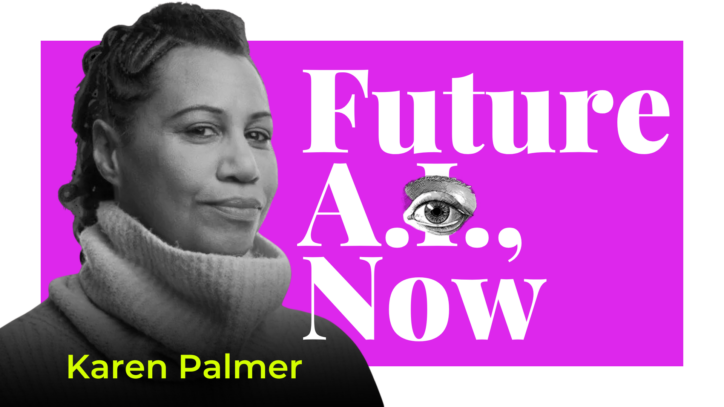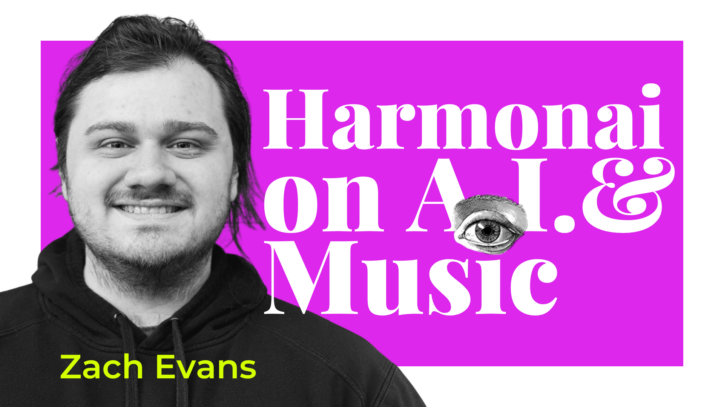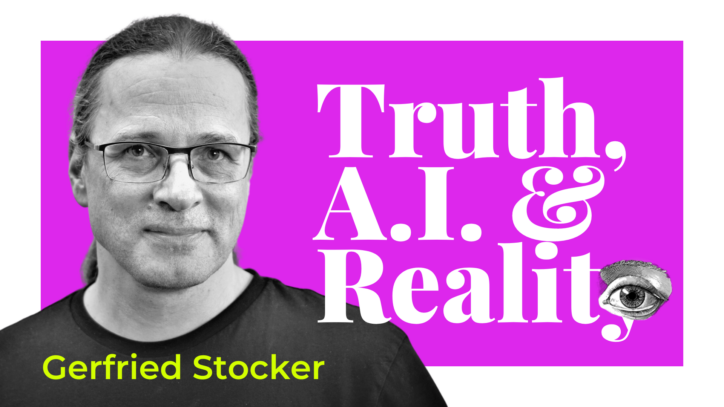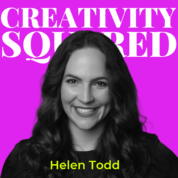
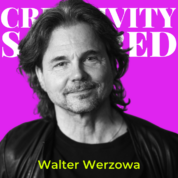
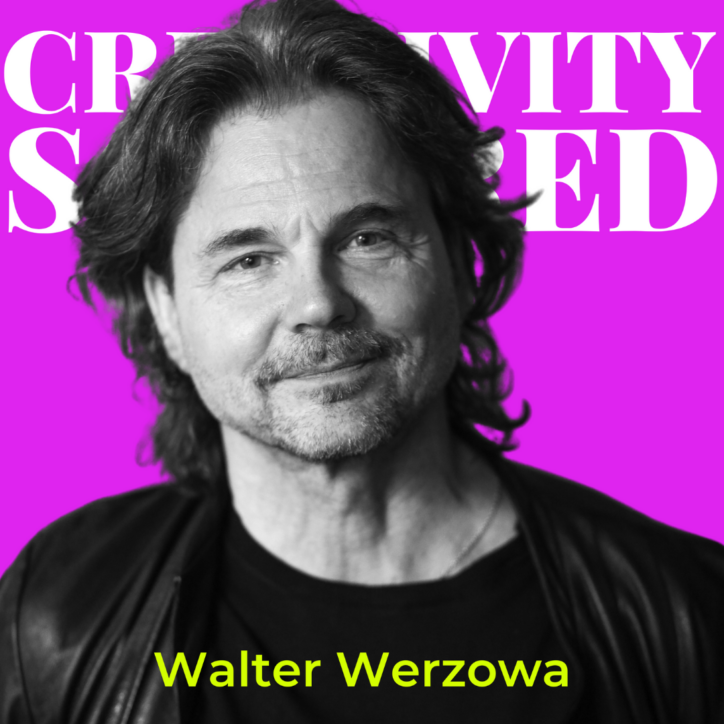
Ep22. Decoding Music with A.I.: Unlock the Magic of Beethoven, Mozart, and Music as Medicine with World-Renowned Composer Walter Werzowa
On the latest episode of Creativity Squared, hear how artificial intelligence is helping write new prescriptions for medicinal music.
Our guest, Walter Werzowa, is an internationally acclaimed Austrian composer, producer, speaker, and professor at mdw – the University of Music and Performing Arts Vienna. He’s an A.I. optimist, who’s using the technology to interpret classical masterpieces and inspire modern audiences.
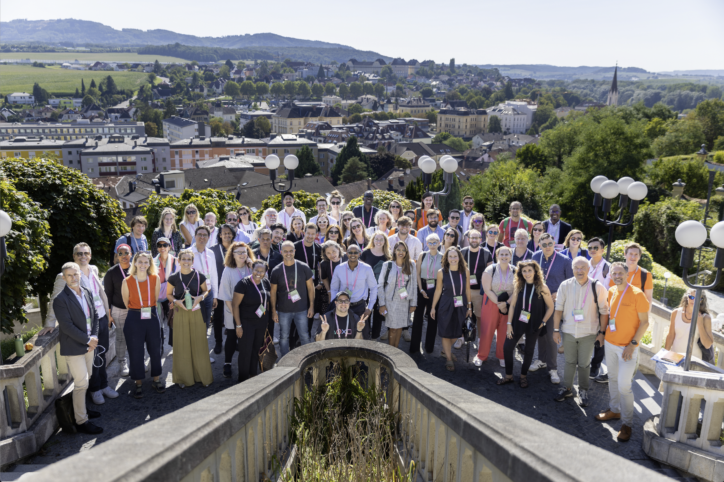
Walter and Creativity Squared host Helen Todd recently met at the BOLD Unconference, a fantastic and inspiring event that the Austrian Chamber of Commerce hosted across four cities in Austria, including a stop in Linz for Ars Electronica (Check out Episode 11 with Gerfried Stocker, the festival’s Artistic Director and co-CEO). This conversation started over a dinner in the Ars Electronica Museum.
“We have to find ways to propel creativity in all of us. Everybody can be creative and have fun. And joy was one of the first things I was telling my students at universities, like you’re amazing composers, you wouldn’t be here if you weren’t. I want to help you keep the joy of creating. Only this will give you a wonderful life with miracles. And those beautiful, life-changing, self-changing moments. That is just so powerful.”
Walter Werzowa
Walter’s many claims to fame include composing Intel’s iconic audio branding, which is the most performed mnemonic and melody in broadcast history. His extensive work in film includes scoring for Steven Spielberg, Wim Wenders, and many more.
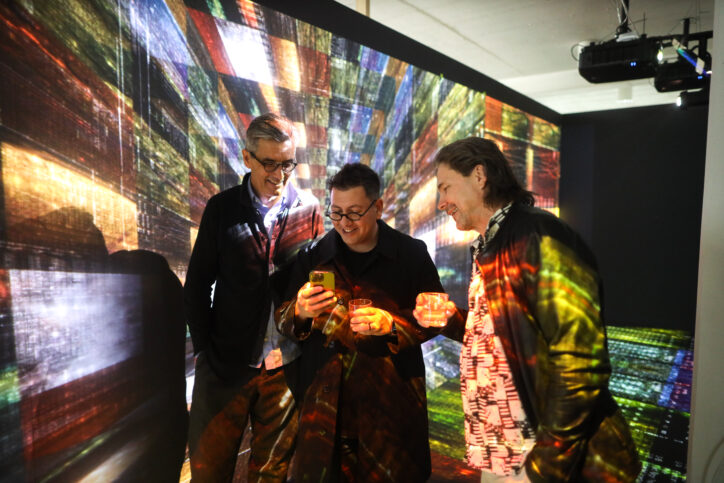
He was part of the team that trained an A.I. model to assist in completing Beethoven’s unfinished 10th Symphony. Currently, he’s the Head of Music at MYTHOS MOZART, alongside a fellow renowned A.I. artist Refik Anadol. Their team creates immersive, multi-sensory experiences showcasing Mozart’s life and music.
Walter’s also a successful entrepreneur in music licensing, branding, and his latest venture, music therapy. He discusses how music helped his son overcome a rare childhood disease, and inspired him to help others. Now, A.I. is unlocking new capabilities to research the human body’s intricate relationship with sound.
The episode covers the story behind the scenes of creating the Intel sound, how working on Beethoven X gave Walter a new understanding of creativity, breakthroughs in audio treatment for epilepsy, and cherishing the joy of creating.
The Four Notes That Changed Everything
It’s said that the audio logo Walter designed for Intel plays every five minutes somewhere around the world.
He got the opportunity through a friend and created the three-second sound over a weekend for a company he didn’t know anything about at the time. Walter had just finished his postgrad in film music at the University of Southern California, where he was writing 60-minute symphonies, so he thought the offer from Intel would be easy money.
“And I realized this was so difficult. You can barely say a meaningful sentence in three seconds. And it was almost impossible to say anything in three seconds with music.”
Walter Werzowa
His breakthrough came hours later in the form of Intel’s tagline, “Intel Inside.” Walter represented the four syllables using 4th and 5th intervals played on synth, xylophone, and marimba. The sound gets its dramatic effect from layering dozens of each note on top of one another.
From there, Walter says it became the “most performed mnemonic ever in history,” opening up industry doors and paving the way for future success. He started his music production and branding company, Musikvergnuegen (meaning “enjoyment of music”), in 1992 and went on to design the music for several screen productions such as Arnold Schwarzenegger’s Eraser and PBS’s popular science show, Nova.
In 2005, Walter founded Music Beyond, a music library that he ran for almost a decade before selling it to a company that was later acquired by Sony.
Channeling Classical Music Geniuses with A.I.
Opportunity came calling again in 2020 when Dr. Matthias Röder, Managing Director of the Karajan Institute, asked Walter if he would like to write with Beethoven.
The goal of the project, dubbed Beethoven X, was to honor the famous composer’s 250th birthday by completing the famous unfinished 10th Symphony with assistance from a custom-built A.I. model. Beethoven had hardly begun the 10th Symphony by the time he died, leaving behind only sketches of ideas and musical phrases.
Walter agreed to join the team, working on the input side to annotate musical themes for the A.I. to learn, and on the output side composing the notes that the model generated into a proper symphony.
“That call was a life changer. Of course, I said yes. It was just an incredible learning process. I think those two years taught me as much as all of university.”
Walter Werzowa
Early on, the team realized that Beethoven did not produce enough material in his lifetime to give the A.I. a true idea of how the composer approached his work. So the team selected works from Beethoven’s influences such as Mozart and Bach added them to the training data.
Through the process of figuring out the best way to get a computer to resemble one of history’s greatest musical minds, Walter says he gained a new perspective on the meaning of creativity.
Walter recounts an early conversation with the rest of the team, where he wanted to review the musical rules that Beethoven had in his time so that they could establish those same rules for the A.I. to follow. Coming from the academic world, Walter says he thought that there needed to be strict rules and agreement on a common understanding of musical structure.
The project’s A.I. lead, Rutgers University Professor Ahmed Elgammal, and others pushed back, arguing that embedding such rules in the model would lead to a product that one of his students might write: musically correct and aligned with Beethoven’s body of works, but not true to the innovative, avant-garde, style of Beethoven’s later works in particular.
“I started realizing what creativity is about, and what Beethoven’s creativity is about, and the constraints we give ourselves sometimes. And I really believe it’s great to learn. But there needs to be a point where you just let go and do your stuff. And that’s what we did.”
Walter Werzowa
For two years, Walter says he would wake up at 5 a.m. to listen to the MIDI files and themes sent over by Elgammal. Sometimes the output he received was, in his words, “awful.” But most of the time, the musical ideas generated by the model were “incredible and inspiring,” to the point that Walter says some days he was moved to tears while sipping his morning coffee.
The team released their final product in October 2021 via a performance by the Beethoven Orchester Bonn in the composer’s birthplace of Bonn, Germany. The team’s 10th Symphony garnered both acclaim and skepticism
Walter recounts how a famous German journalist asked how the A.I. could produce music like Beethoven when the A.I. could never feel love or heartache like Beethoven did. The question strikes at a fundamental debate happening right now on whether A.I. can be considered the “creator” of a work, when the technology appears to lack all of the human elements and experiences that we traditionally associate with creativity.
For the sake of Beethoven X though, Walter says that the focus isn’t on whether Beethoven was ever in love, but more so on how he expressed those feelings in the creation of his music.
“And if we analyze this, we get his way of love sickness, and no human could do this [analysis]. So in that sense, the A.I. is incredibly objective and neutral. And to me, it was an incredible partner to get inspired and put things together. It really ended up being a beautiful teamwork between humans and technology.”
Walter Werzowa
MYTHOS MOZART with Renowned A.I. Artist Refik Anadol
Following his work with Beethoven, Walter took up Mozart.
He and a team of collaborators opened up MYTHOS MOZART in 2022. It’s an immersive experience that takes participants through several different mini-digital worlds, each depicting a period and/or theme of Mozart’s life and music. The installation is housed in the same location where Mozart lived and died (just in a newer building, as the apartment Mozart once called home was destroyed after his death).
Walter designed and composed the soundscapes for the experience, recording the soundtrack with help from his students at the mdw – University of Music and Performing Arts in Vienna.
Digital A.I. art visionary Refik Anadol used data and images from Mozart’s life to create the visual imagery of the experience. Anadol is known for using A.I. to create massive digital artworks, such as the photo-realistic eyeball displayed on the recently completed Las Vegas Sphere. Each individual work can take millions of data points to produce. Watch the making-of MYTHOS MOZART in this video.
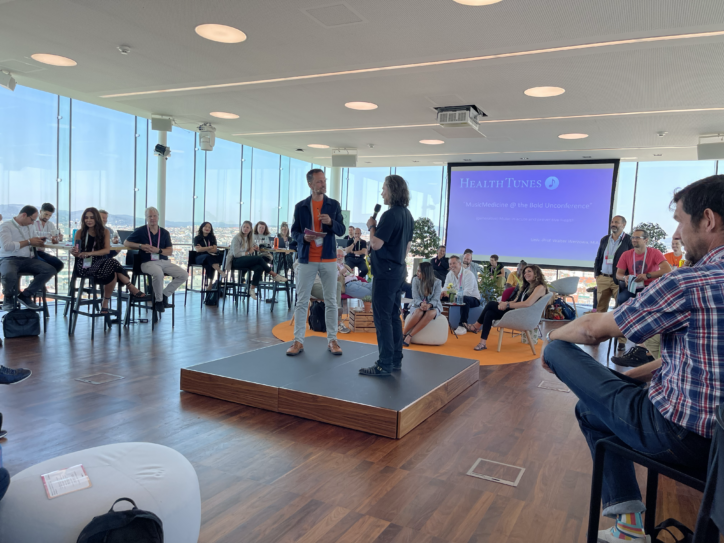
HealthTunes: Supporting Human Wellness with A.I. Music
When Walter’s son was five years old, he was diagnosed with a rare childhood disease that causes the hip joint to repeatedly deteriorate and regrow. Instead of opting for surgical treatment involving metal plates, screws, and a long recovery period, Walter’s family decided to go a different route.
“We employed osteopathy, acupuncture, and sound. And a year later, he was running again. And suddenly, it was clear that it was more than just something really interesting. I realized that sound and music was really an important factor, and I thought, I’m gonna give that back to the world.”
Walter Werzowa
So in 2016, Walter launched HealthTunes, a subscription service that curates sound and music therapy backed by scientific research to help patients suffering from physical and mental ailments.
The service began with a focus on using sound to encourage bone regeneration and support pain management. Since then, it’s expanded to offer therapies for Alzheimer’s and the side effects of chemotherapy treatments.
Walter says that more use cases are cropping up all the time. In maternity wards, doctors are now using music to help settle rapid heartbeats in babies born prematurely. Patients in many MRI clinics can listen to music specially designed to muffle the sound of the machine and calm feelings of claustrophobia.
In the video, you can see the music helping bring the baby’s elevated heart rate to a resting heart rate through music. Walter shared that the effect almost seems like magic that often brings mothers and doctors to tears. It’s so simple, yet works. These are the moments where Walter reflects on the impact of intentional music for healing, health, and the power of sound for preventative health.
With the help of A.I., research into the effects of sound on human health is accelerating. Walter cites research findings that Mozart’s Sonata for Two Pianos in D major K.448 can reduce the incidence of seizures in people with epilepsy by 70 to 75 percent, on par with the efficacy of drug treatments.
The reason that Mozart’s sonata has this effect is unclear, but Walter thinks that A.I. can help get us closer to the answer.
“A.I. is powerful. We could recreate the misfiring of brain waves of an epileptic brain and hone in more on what that secret sauce might be. We can also then find out how we can compose music like that, and would it be possible that we have generative music composed for that person in the moment when she or he needs it? And that would be just a lifesaver. Pun intended.”
Walter Werzowa
As someone who loves and lives for music, Walter says that he’s starting to see music more as something we have for health, rather than just for entertainment. He says he’s looking forward to seeing more of sound’s mysterious health impacts unlocked by research and technology.
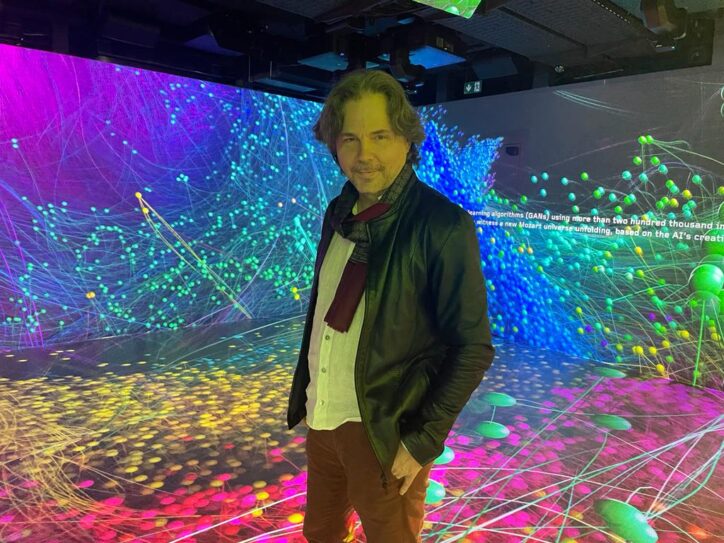
Keeping the Joy in Creativity
In his closing thoughts, Walter implores all of us to engage in the joy of creating, with the same curiosity and joy of a child discovering the world around them.
“I want to encourage all of you to find your creative soul and enjoy and be resonant. And that’s the beauty of music as well, because music is pure creativity. Resonate with it and find your own creativity with it — it unleashes all this potential in you.”
Walter Werzowa
Walter, for one, is looking forward to the new possibilities that A.I. will offer us to engage in the joy of creativity, as both creators and observers.
Links Mentioned in this Podcast
- Intel Sound
- Beethoven’s Unfinished 10th Symphony — The Wire
- MYTHOS MOZART
- Audio Branding and Composition — Musikvergnuegen
- HealthTunes Website
- Karajan
- Beethoven X
- Effect of the Mother’s Heartbeat — APM
- Best Music for MRI — New Music World
- Musical Components Effect in Epilepsy — Scientific Reports
Continue the Conversation
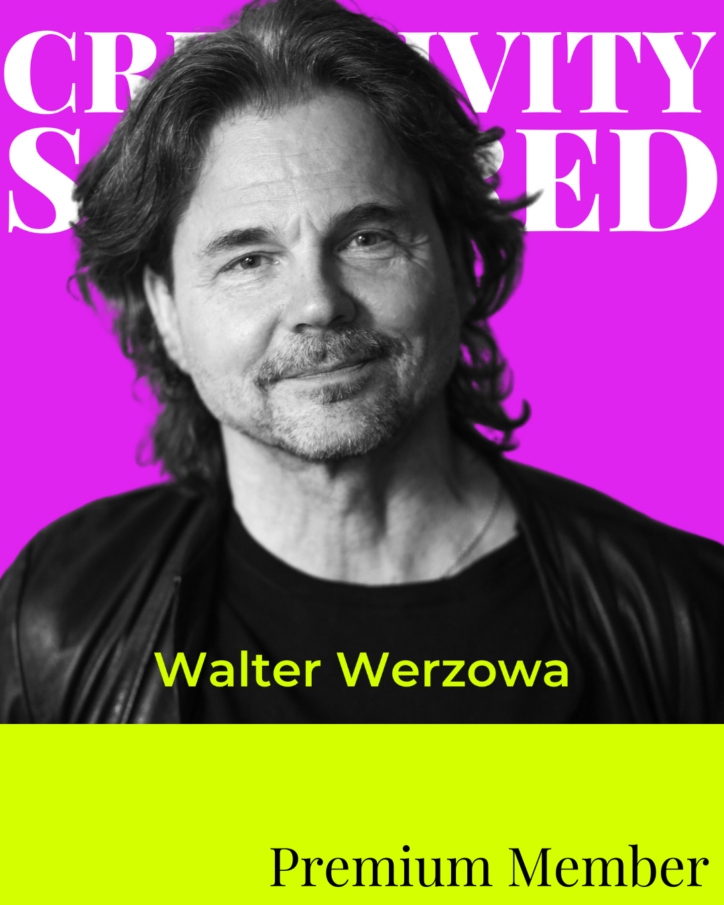
Thank you, Walter, for being our guest on Creativity Squared.
This show is produced and made possible by the team at PLAY Audio Agency: https://playaudioagency.com.
Creativity Squared is brought to you by Sociality Squared, a social media agency who understands the magic of bringing people together around what they value and love: https://socialitysquared.com.
Because it’s important to support artists, 10% of all revenue Creativity Squared generates will go to ArtsWave, a nationally recognized non-profit that supports over 150 arts organizations, projects, and independent artists.
Join Creativity Squared’s free weekly newsletter and become a premium supporter here.
TRANSCRIPT
[00:00:00] Walter Werzowa: We have to find ways to propel creativity in all of us and everybody can be creative and live your potential, have fun, enjoy. This is one of the first things I always tell my students at university is that you guys are amazing composers. You wouldn’t be here if you’re not. What I want to help you is to keep the joy of creating.
[00:00:28] Walter Werzowa: Only this will give you that wonderful life with miracles. And those beautiful moments of life -hanging, self-changing moments. And it’s just so powerful.
[00:00:48] Helen Todd: From the world capital of music, today’s guest is Walter Werzowa, an internationally acclaimed Austrian composer, producer, speaker, and professor at MDW, the University of Music and Performing Arts, Vienna.
[00:01:01] Helen Todd: With over 30 years of experience in the music industry, Walter is a passionate and visionary leader in audio branding and AI music. His mission is to explore and advance the intersection of music, technology, and human emotions, and to inspire and empower others with the power of sound. He has created and produced award-winning music and sound design for global brands, as well as for films, commercials, and trailers.
[00:01:31] Helen Todd: Notably, he composed the ubiquitous Intel audio branding, which is the most performed mnemonic and melody in broadcast history, the main titles to Schwarzenegger’s Eraser, and the 1980s gold platinum hit “Bring Me Edelweiss”. His extensive work in film includes scoring for Steven Spielberg, Wim Wenders, and many more.
[00:01:53] Helen Todd: Walter also founded several successful music companies, including Musikvechnuken, Beyond Music Library, the Music Medicine Consultancy and HealthTunes, offering cutting edge music production, licensing and music therapy solutions. Walter recently collaborated with Harvard, Rutgers and Cornell on the Beethoven X AI project, which utilized AI to complete Beethoven’s unfinished 10th symphony.
[00:02:23] Helen Todd: Currently, Walter is the head of music at Mythos Mozart, an immersive experience that brings to life the magic of Mozart. He is also an advisory board member at Spatial Inc, a company that creates spatial audio for virtual and augmented reality. Walter and I recently met at the Bold Unconference, a fantastic and inspiring event that the Austrian Chamber of Commerce hosted across four cities in Austria, including a stop in Linz for Ars Electronica.
[00:02:52] Helen Todd: I’m so excited to share our conversation with you today that started over a dinner in the Ars Electronica Museum. In today’s episode, you’ll discover how AI is unlocking the profound impact of music as medicine, along with Walter’s work on the Beethoven X AI project and his collaboration with renowned AI artist Rafik Anadol on Mythos Mozart.
[00:03:17] Helen Todd: In every conversation with Walter, his love and joy for music is contagious, as well as his passion for supporting composers’ creativity.
[00:03:32] Helen Todd: Welcome to Creativity Squared. Discover how creatives are collaborating with artificial intelligence in your inbox, on YouTube, and on your preferred podcast platform. Hi, I’m Helen Todd, your host, and I’m so excited to have you join the weekly conversations I’m having with amazing pioneers in the space.
[00:03:51] Helen Todd: The intention of these conversations is to our collective imagination at the intersection of AI and creativity to envision a world where artists thrive. Walter,
[00:04:10] Helen Todd: Welcome to Creativity Squared. It is so wonderful to have you on the show
[00:04:15] Walter Werzowa: Helen, it’s so good to see you and hear you, and I’m glad and honored to be here with you. Yeah,
[00:04:21] Helen Todd: Walter and I just met recently in Austria for an amazing event that the Austrian Chamber of Commerce did and hosted and brought amazing people from cross sectors together.
[00:04:32] Helen Todd: And Walter was there, and we’ll learn a lot about why today. But for people who are meeting you for the first time, Walter, can you introduce yourself?
[00:04:42] Walter Werzowa: Yes. I’m Austrian born and never really liked to live in Austria. My parents say that as far as they can think back, that I always dreamt of living in the United States.
[00:04:57] Walter Werzowa: And eventually the day came where it was enough, a pack this was in the nineties and flew to Los Angeles and I got accepted to post graduate at USC in film scoring. And from then on, I think my life was all about incredible luck and serendipity. And my teachers were Jerry Goldsmith and Bruce Broughton and David Raksin.
[00:05:24] Walter Werzowa: And they brought me into inspiration and music love and they opened a new world. And I, of course, stayed in Los Angeles. I love being there. I love the openness of the States, especially of California and started working hard.
Helen Todd: Well, thank you for that introduction. And I guess one thing too, that you’re pretty famous for is the Intel mnemonic or audio logo that you came up with.
[00:05:54] Helen Todd: So I’d love to hear more about that as we kick off the show.
[00:05:58] Walter Werzowa: So in like the beginning of the nineties, right after school, Kyle Cooper, he’s an incredible designer..graphic designer. He asked me to work on Intel and I have to be honest, I didn’t know what Intel was. And so he showed me this graph with six key frames about this Intel spiral and said, “Hey, I need three seconds of music for this.”
[00:06:30] Walter Werzowa: And I loved writing film music and symphonies…those things. I like 60 minutes and longer, and somebody asked me for three seconds of music. Didn’t really make sense. And I thought that would be easy money. So short and be fine. And I realized this was so difficult. You can barely say a meaningful sentence in three seconds and it was almost impossible to say anything
[00:07:00] Walter Werzowa: in three seconds with music. So I was super frustrated and I looked into the scores. I looked from the Beatles to Beethoven to Bach. If there’s any motif I can get inspired from.. nothing worked. And on that weekend, I was sitting in front of the piano and I looked again at those graphics, which looked beautiful, and I suddenly realized they had a tagline — Intel Inside.
[00:07:26] Walter Werzowa: And so I thought, if this was a song, obviously those are the lyrics, Intel Insides would be four syllables. There should be four notes. It is about engineering, Intel, and like I learned about this, it’s so precise and left those best at the time fastest processes so, fast tempo. And since they wanted to have that mnemonic resonate with the whole world, if you’re in India, which is a big market or Arab countries or Asia, wherever you are, it needs to have the same
[00:08:02] Walter Werzowa: emotional, inspirational sound. I used the fourth and the fifth and I constructed this way. I explained that to Kyle. He said, “Oh, that sounds good, but how does it sound?” And I played it for him and then same thing with Intel. And he said, well, great idea. And that was it. And so that thing became the most performed mnemonic ever in history.
[00:08:27] Walter Werzowa: And the most performed melody in broadcast in the nineties. And basically, it was constructed, composed in the matter of a couple of hours on the weekend. And it also changed my life.
[00:08:41] Helen Todd: I love that. I feel like you were ahead of the curve from all the TikTok and social media where attention and music and video is all getting compressed to how much you can convey and even GIFs in like seconds.
[00:08:56] Helen Todd: So, so that’s really neat. Well, why I really want to connect with you is about your work in AI and you’ve done some really interesting projects in artificial intelligence and music. Starting, I think if I understand correctly, with the Beethoven, that was your first foray into AI and music.
[00:09:16] Helen Todd: Is that correct?
[00:09:17] Walter Werzowa: That’s correct. Also, I am tech nerd. I love technology and I love technology when it inspires us. And so three years ago, I got this call from Matias Rutter, he’s a Harvard musicologist and he said, “Hey, Walter, would you like to write with Beethoven?” And can you imagine it’s like between whatever just happened, getting that call.
[00:09:44] Walter Werzowa: I felt this is a prank call and said, “yeah, and I would like to write with Radiohead and the Beatles and maybe Bach as well.” And he said, you know, just focus, and he’s from Austria. So, it was a nice German accent like mine. And he said, we’ll do those later. Let’s start with Beethoven. So, I felt he is serious about it and I said, what would you..he’s dead.
[00:10:11] Walter Werzowa: He said, yes, I know. And said, we want to use AI and you to finish Beethoven’s 10th symphony. And so, suddenly it like dawned on me this is just incredible. That call, is again, a life changer. And of course I said “yes.” That’s something I learned in the States. It’s like, saying more yes than no.. and I think Europe and I don’t want to rag on Europe is a little bit more of a no continent.
[00:10:39] Walter Werzowa: So I started this journey and we wanted to finish this in a matter of nine to ten months. And I have to say COVID helped us that everything got pushed back. And so after two years, we finished. And it was just an incredible learning process. I think those two years taught me as much as all university.
[00:11:05] Helen Todd: That’s amazing. So can you walk us through the creative process and the tools and like was this an intimidating project to finish a Beethoven piece?
[00:11:19] Walter Werzowa: It was everything. There were moments where I thought, Oh my God, why did I say yes? And there was so many moments. I love it. It’s like there were moments I had my studio in, in, in Austria for that work where every morning Rutgers University would generate new themes and MIDI files and I would rush in the morning into my studio.
[00:11:49] Walter Werzowa: It’s like, I love to get up early. It’s like five o’clock and listen to what he sent. And really sometimes like the sunrise, I would have my coffee and I would listen to music which made me teary. It’s like, I cried a couple of times. It was so powerful. Sometimes it was awful, but most of the time it was incredible and inspiring.
[00:12:13] Walter Werzowa: And the biggest lesson I learned, and I want to share with everybody in the world is that I thought that we need strict rules and agreements for creativity for music. And I came from the academic world and so when I met Ahmed Elgammal, who was in charge of the AI, I said, yeah, let’s sit down and let’s put all the musical rules, which Beethoven had at this time into your machine.
[00:12:49] Walter Werzowa: And he looked at me like, I’m insane. And said, you know, no. That would be wrong. It’s like, that would sound like any of your students. You don’t want that. Beethoven had his own style. He broke so many barriers. He not for the sake of it, but the disobeyed so many rules and that made Beethoven.
[00:13:12] Walter Werzowa: So if we would be with constraints, it would not sound Beethoven. So we have to learn strictly from Beethoven. And it took another five seconds, but then it was like this huge thing, which I started realizing what creativity is about and what Beethoven’s creativity is about and the constraints we give ourselves sometimes to rethink what we have to do.
[00:13:43] Walter Werzowa: And I really believe it’s great to learn. It’s fantastic. I suggest for anybody. Study as much as you can, learn as much as you can, but there needs to be a point where you just let go and do your stuff. And that’s what we did.
[00:13:59] Helen Todd: I love that after such a successful career at this project made you rethink the creative process.
[00:14:07] Helen Todd: I find that so wonderful and inspiring. So, how did it work? What tool did you use? Was it a custom AI tool? And then I guess I’m also curious, what aspect did you bring for the piece? Because, like, clearly, it, all of the rules didn’t go in because you needed to break the rules.
[00:14:29] Helen Todd: So, were you coming up with the rules to break in the piece and to help train the AI or giving it more data sets to train and sculpt or taking what it was giving and then playing with it and modifying it? So, I’d love to get into the weeds of the actual process.
[00:14:46] Walter Werzowa: Yes. You already nailed it.
[00:14:49] Walter Werzowa: One of the most important parts is the training set, the bucket, as we call it. Initially. And we made so many mistakes in the beginning and we learned with very mistake. First we put all music we had into the bucket and we’re wondering why suddenly it would sound like Radiohead and Shostakovich. So, clearly the next day we knew we need to stop with Beethoven’s work.
[00:15:12] Walter Werzowa: The AI didn’t have enough data just by Beethoven’s work, so we realized we need to also add anything that influenced him. Bach, Mozart and so on, anybody he might have listened to and inspired him. And those geniuses, they hear a piece of music and it’s in their brain, it’s in the mind, in the consciousness forever.
[00:15:39] Walter Werzowa: And they analyze it. The beautiful stories about this. And so that was one part. We had to help the AI with one thing to annotate. And teach the AI one thing, what is a theme? Because Beethoven is so thematic. It’s like, he’s probably the most motivic, thematic composer in that era. That he has this snippet of very strong melodies and how he develops them.
[00:16:09] Walter Werzowa: And AI had challenges at the time. It would be different today. To know what is the seed, the theme, how is it developed? Is it a development which is strictly rhythmic or melodic or both? So, there was a little bit of hand holding there. What was amazing for me is as well that the AI doesn’t think really in musical terms. It thinks pitch to whatever the note is and absolute time from the beginning.
[00:16:43] Walter Werzowa: It doesn’t have our music grid in it’s brain, and so we realized that we all have different conventions. AI is experiencing different than I do, or maybe somebody who never saw a score. But it’s, but it comes to the same. It’s about the notes. And when after the premiere, a couple of journalists stood up and of course, a couple of people very angry about us to do this.
[00:17:10] Walter Werzowa: And a couple of people like really applauded, but there was this one German, famous journalist.. he said that, “ah, this is this is not okay. You can’t do this. The AI never was drunk, was never lovesick, never had water poured over cold water over their heads to get inspired. This can’t be working.”
[00:17:34] Walter Werzowa: And so I responded, is it really my point of focus? If Beethoven was in love or not, if he was lovesick, if he was drunk..was it more important what came out of it? If he was lovesick, what did he write? And if that is the important part, that is what is left for us. That is in any of the scores he wrote. And if we analyze this, we get
[00:18:04] Walter Werzowa: his way of lovesickness. And nobody else, not a human person could do this. And so in that sense, the AI is incredibly objective and neutral and could really focus without knowing the now how did he feel and what did he convey to us? And so to me, it was an incredible partner to write with the AI and get inspired and putting things together.
[00:18:35] Walter Werzowa: And it really ended up being a beautiful teamwork between humans and technology.
[00:18:44] Helen Todd: I love what you said about a beautiful teamwork between humans and technology. I’ll be sure to put the links and embed the music of Everything mentioned in today’s conversation in the dedicated blog post that goes with this episode.
[00:18:56] Helen Todd: I’m sure everyone’s really curious to hear Beethoven’s 10th symphony that you helped finish and the other projects that we’ll get to. The link for it will be in the episode description. And I’m curious, when you were starting, did you ever have any hesitation about kind of what the journalists pointed out in collaborating with AI in this way, or did you always see it from the outset of this is a great tool and exciting project?
[00:19:27] Walter Werzowa: I always thought it’s an amazing tool. And even if it sends the weirdest pieces of music.. because we humans, when we write, we’re not always writing genius pieces, like we, we write anything. I wrote stuff, which was awful as well. And I think that made it fun and that may be exciting. And it was great that there were iterations, which really sounded bad, but I never thought this is a bad partner.
[00:20:01] Walter Werzowa: It’s like, it was exciting and challenging. I have a question to you. What do you think is one of the main drivers of creativity?
[00:20:15] Helen Todd: Oh, man, that is a great question. And you know, it’s funny cause I have the podcast called creativity squared and we explore this and I think depending on who you ask…
[00:20:29] Helen Todd: everyone will have a different answer and has a different relation to it. And I think the thing that interests me the most about creativity is that we assign it to be such inherently human, to like be human is to be creative. And now, with technology being able to you know, pair two ideas together that might be new and we call creative. If machines and AI can do this, you know with millions and billions of ideas to create ideas it kind of lends itself to this existential question of is to be creative inherently a human trait?
[00:21:06] Helen Todd: So, I find that a really fascinating thing but I think in.. Yeah. Creativity is just taking an idea and manifesting it into reality. To create. I think we’re all creators and all are creative inherently, but I don’t know if it’s maybe fundamentally.. or only for humans, maybe.
[00:21:26] Walter Werzowa: I love what you just shared.
[00:21:28] Walter Werzowa: And I would leave only for humans and not aside because there could be so many theories and for me, creativity is about choice and the vulnerability and the boldness of choice. I’m sure in Beethoven, he loved to walk through the vineyards, always had a sketchbook with him and the pen. And would write down the ideas and was sometimes so into them that he would just smear them wildly on pages.
[00:22:00] Walter Werzowa: And what happened afterwards is that he might have put a couple of notes next to the notes he just scribbled five days ago. And suddenly a new context randomly, or not randomly, a new context came out. And then his choice was.. Oh, my God. I want to use this with this. And that became something really new and innovative.
[00:22:26] Walter Werzowa: And so those creative accidents, sometimes that bold choice, I want to do this. And if this is Van Gogh or Picasso or Cage or whoever that is.. Whoever said something very powerful had this boldness of choice in saying, this is what I want to say.
[00:22:49] Helen Todd: I love that. One of our writers Jason Schneider who’s done a few blog posts for us.
[00:22:55] Helen Todd: He did a really wonderful piece on what is art? Which has a lot of similarities especially, you know, in the age of AI, you have like, this discussed in courts, like how much of the human touch needs to be involved in art to be copyrighted. But his thesis that he put forward as, as long as there’s some, human choice in it, whether it’s curation, selecting an image from DallE or one of the machines or, you know, any human touch of choice makes it art.
[00:23:27] Helen Todd: But I know a lot of people listening might, might disagree with that as well.
[00:23:31] Walter Werzowa: Yeah, that would probably be another podcast and I would love to be part of that. But, what you just said brings me to another question. May I ask you another question?
[00:23:45] Helen Todd: This is the most interviewed I’ve been on my show, but yes, let’s go.
[00:23:49] Walter Werzowa: Can you define in one sentence, what is music?
[00:23:54] Helen Todd: Oh, man. Well, I should also say out of the arts. I love listening to music. I don’t have an ear for music. In Tennessee, where I grew up you would say, I couldn’t carry a tune if it was in a bucket.
[00:24:11] Helen Todd: I’m not the most versed in full confession of all things music, but I don’t know.. to me, music is audio vibrations that impact us in different ways. I love to think about just the vibrational impact of music more than anything.
[00:24:30] Walter Werzowa: Yeah, I think that you’re super close and I ask my students every year, and it’s funny that professional musician, I always think, of course oh no, how can I?
[00:24:42] Walter Werzowa: And so far, nobody really had like that answer. Edgar Varese, an amazing composer to me has. Had the best answer at the time, music is organized sound. I would like to add one word to it, intentional. And I think that will jive with what you just said, intentional, organized sound. That is what music is to me.
[00:25:11] Walter Werzowa: And so far the best description, but if you were any listener has a better one, would love to hear it because we are immersed in music. We love music and many of us listen to it for hours and hours. But, how can we describe it?
[00:25:30] Helen Todd: Yeah I’ve never thought that deeply about defining music. So I will marinate on that.
[00:25:35] Helen Todd: And I would also love to hear what our viewers and listeners think. And I guess to that point too, I mean, like birds sing and for different reasons, would you consider that music as well? Or is the intentional more for like making music as art for humans?
[00:25:54] Walter Werzowa: I love this interview because yeah, that’s a huge question.
[00:25:57] Walter Werzowa: The birds, see the birds have a different modality in that. They are most of them pitch perfect and by millisecond accurate for them, it is almost a muscle they train with micro memory and can bring that melody back. Like, like absolutely accurate. So it is, I think a different modality.
[00:26:27] Walter Werzowa: It’s like when we create music there’s a different, and that’s where the intention comes in. Birds have it for communication and most of it mating.. I guess humans might have that as well for those reasons, but but not only, and and that brings us maybe to the next chapter. I think I love music.
[00:26:53] Walter Werzowa: I live for music. I have passion for music, but I think more and more that we have music for health more than entertainment. And the latest science is just, it’s incredible to learn what music does to us, to our mind, to physical and mental wellbeing. It’s incredible.
[00:27:22] Helen Todd: Well, since you brought that up, let’s segue and tell us about Mozart and that specific piece in Mozart that’s been proven to help with epilepsy.
[00:27:33] Helen Todd: Because I find that super fascinating. And it involves AI as well. So I don’t want to steal your thunder, so I’ll let you explain it.
[00:27:41] Walter Werzowa: Thanks for opening up the thunder. And yeah, there is this one piece of Mozart’s that is four-four, eight. It’s a sonata for two pianos.
[00:27:53] Walter Werzowa: That is proven, scientifically proven the many studies on that to help with epilepsy. It reduces seizures by 70 to 75%. That’s an incredible high number. Some epilepsy drugs can do it. And then we know there are a lot of patients drug resistant. So, what happens to those patients who can’t take any pharmaceuticals anymore?
[00:28:22] Walter Werzowa: So, there is music which seems a savior in that sense. And it is incredible to hear if a patient, an epilepsy patient, does not like Mozart. It still helps. And Dr. Eugen Trinke and Ivan Rektor at the university and Trinke, he was the head of the World Epilepsy organization
[00:28:46] Walter Werzowa: researched all that, and there’s not another piece of music that has this high efficacy. There is a Haydn piece, which is also pretty good and strange enough, it works differently with males than females. Most of it is the same for male and female demographic. And I talked to those two professors and I would love to start this research
[00:29:15] Walter Werzowa: to find out what is the secret sauce of that piece of music and can we apply this to new music and write new music and here comes AI, very handy. And so we need that hospital, which we’d have like a Brennan and Salzburg with lots of epilepsy patients and see what is it? Is it maybe one bar of music in that sonata?
[00:29:40] Walter Werzowa: Is it the whole thing you need to listen to? Is it one chord? Is it one melody? I have my theories and I think it’s the overtone structure, which is very important there. But researching this will change the world and can help thousands and thousands of people.
[00:30:00] Helen Todd: That’s amazing. And I’m so curious how this was discovered, if it was a happy accident or whatnot.
[00:30:06] Helen Todd: But tell us about how you’re going to use AI to help answer this question cause if I understand correctly from our conversation in Austria, actually it was at the Ars Electronica museum, where we had a fabulous dinner. You’re using AI to kind of decode the song and try to figure it out.
[00:30:27] Helen Todd: Is that correct?
[00:30:29] Walter Werzowa: Yes. AI is powerful in so many instances. We can recreate brain functions and we could recreate the misfiring of brain waves of an epileptic brain and see what happens from different perspectives with that music and hone in more and better what this, that secret sauce might be.
[00:30:52] Walter Werzowa: We can also then, once we see what it is, find out how can we compose more music like that? And would it be possible that we have generalist music for that patient, that in that moment, the highest efficacy music piece is composed for that person in the moment when she or he needs it? And that would be just a lifesaver, pun intended.
[00:31:20] Helen Todd: So, the AI is both from the reading the brainwave data to understand what’s happening from that side and then also understanding the musical side, the impact, and then recreating the music for the health benefits. So it’s kind of twofold from both angles, right?
[00:31:37] Walter Werzowa: And to have like biosensors and then real time generative music
[00:31:42] Walter Werzowa: to help. And to me, that’s such a powerful construct. As I’m talking to Ivan Rektor and Eugen Trinke, something really needed.
[00:31:53] Helen Todd: And when you say real time is that in regard to matching a music piece to what is needed or actually creating on demand a customized piece for that person to address what they need in that moment?
[00:32:10] Walter Werzowa: I love the question. I see you’re in that world because it’s both. It could be that a piece of music is generated in the moment for that patient. Or if the patient has music, he and she loves that this is enhanced with whatever that structure is, that sound is, that overtone row is, whatever it is, to make that piece of music better for that use case.
[00:32:39] Helen Todd: That’s interesting. Oh, there’s been a lot of talk more on I guess this the storytelling side and films that in the not too distant future and shoot, the tech might already exist and I’m not aware of it where we’ll get customized films. Like I’m in the mood for this tonight.
[00:32:57] Helen Todd: Can you make a rom com with a happy ending to cheer me up? So, I don’t see it. That big of a leap to do that with music. And I guess that’s what musicians do often time of just picking up a guitar and themselves. But for those who aren’t musically talented in that way or want to use AI to do customized music to our moods or feelings or health.
[00:33:17] Helen Todd: I think that’s really fascinating.
[00:33:19] Walter Werzowa: It’s inspiring. And I think it’s a philosophical question. And I have in my family, a couple of members they just think AI is the end of the world and I don’t think so. It’s like, at this wonderful dinner as well, we had together and in Vienna met this MIT professor, Furst, and they implement latest technology and I have children, so I’m often worried about the future and about the disasters and reading the news is not really something where you think, Oh my God, the future is brilliant and bright. But, she found out a way now to clean up the seas, to take the CO2 out of
[00:34:06] Walter Werzowa: seawater and make fuel with it.. and I just wanted to hug her because it’s just this was the most hopeful thing I’ve heard in the longest time. I shared it with my son as well and he wants to be engineer and it’s so inspiring. There are ways that we can make this a part better world again.
[00:34:25] Helen Todd: I think one thing related to that goes back to what you said about music is just the intentionality. Like, how do we want to use this tech? And that was something that I spoke to at my little talk in as part of the conference of what’s our intentions. And that will really dictate a lot of ways of how we deploy and use these AI tools.
[00:34:46] Walter Werzowa: Absolutely. I think and they support us and anything can be used and abused and go in any direction. I believe more and more that we need strong tools to turn the world around and to be hopeful again. And again, that’s a couple of stories at this wonderful weekend with all your amazing creative,
[00:35:12] Walter Werzowa: crazy professors and dreamers and doers. Yeah, it’s like, I see a brighter future again. That weekend was incredible powerful.
[00:35:22] Helen Todd: Oh, I’m at heart forever hope a holic and optimistic. And at the same time, I acknowledge there’s some real concerns and red flags, and we’re at a pivotal moment to decide how we want to use these tools.
[00:35:36] Helen Todd: So, I’m in the camp to be proactive about human centered. and supporting humans from the outset. Well, related to going back to music as medicine you also have an app that more or less supplies music to help people called HealthTunes. Can you tell us about that?
[00:35:55] Walter Werzowa: Yes, that’s again, something life brought to me, to us.
[00:36:02] Walter Werzowa: My son, when he was five years old, had a very severe illness. It’s like protest femur to the hip joint falls apart and regrows again. It’s necrosis. It’s very painful and it’s a year long process. And my wife, my family, we decided not to go the surgery route or metal braces or have the kid two years in the hospital.
[00:36:29] Walter Werzowa: We implied osteopathy, acupuncture and sound. And a year later he was running again and for us it felt.. that’s the way it is. And UCLA health, incredible hospital, university clinic said, how did you guys do that? And suddenly it was clear that was more than just.. that’s something really interesting.
[00:36:56] Walter Werzowa: And, I realized that sound and music was really an important factor and the thought..I’m going to give that back to the world. It’s like, it came to me and I started a nonprofit called HealthTunes. And that started first in the world of leg protests and regrowing bones and pain.
[00:37:19] Walter Werzowa: And now there are therapies for Alzheimer’s and help in oncology with chemotherapy side effects and anxiety and burnout. There’s so many incredible use cases and they’re all backed up by research. And we know a lot how music works and that music works and now we’re finding out why it works.
[00:37:48] Walter Werzowa: So, that is the next step. And that opened up doors and hospitals. Wellstar Health in Atlanta, it’s like 300 hospitals, they’re using it extensively in maternity and recreational centers. It is working and it’s just, sometimes it feels like magic. In NICU, when the baby’s preemie is with elevated heart rate, it shoots up to 200 sometimes..
[00:38:18] Walter Werzowa: We align the music 200 beats per minute of the heart rate with the same beats per minute of music imply a ritadando, meaning that music slows down exponentially and the heart rate of the baby follows. And then a minute later, that baby is at resting heart rate. And you see the mothers and sometimes the doctors in tears next to that baby because it was so powerful and so simple and it works.
[00:38:48] Walter Werzowa: And those are the moments where I think, wow, music: intentional, healing, health, and it’s preventive health.. it’s organized sound. It is so much. We are even in the project with a company to MRIs, and a lot of patients get claustrophobic or scared during MRIs. And so, Prenuvo has those clinics in many major cities, and we supply specific music to help to reduce claustrophobia.
[00:39:27] Walter Werzowa: And mask the sounds that those loud sounds in there, but also help people to stay calm and get the treatments they need to get.
[00:39:36] Helen Todd: That’s so amazing. And I hope everyone listening is, if you’re not already curious, gets really curious about this and download your app Health Tunes, which I’ll be sure to link in the show notes and the dedicated blog post.
[00:39:51] Helen Todd: I was curious since you’ve done a lot and working with understanding, you know, sounds and their impact. I’ve read, and I’ve gone down, you know, rabbit holes of the binaural beats for trying to go to sleep and relaxing but I’ve also come across you know, the sound ohm is, has been said to be the sound of the universe.
[00:40:13] Helen Todd: So has that come across in any of the studies of the impact of that that you could share with us?
[00:40:20] Walter Werzowa: Frequency is a key and again, organized sound it’s like, ohm has a resonance. And when you speak or perform the ohm, your whole body resonates and I would love to invite any of the listeners to look up human resonance.
[00:40:38] Walter Werzowa: The earth has those four bands of frequencies, very low frequencies, we don’t hear them, but we feel them like seven Hertz and 14 Hertz. If astronauts would leave, I was fierce here. They will get that sound pumped into the capsular to stay healthy and sane without just frequencies. And we don’t even know that they’re here.
[00:41:01] Walter Werzowa: Our health would degrade. So there are some of those frequencies which really so powerful and you could call them mantras or
[00:41:12] Walter Werzowa: spirituality or sounds or frequencies of viral beats, like that resonance is so important and it doesn’t matter how you label it, but that ohm can be very powerful for you and if you learn about it that might be the resonance you need to stay healthy.
[00:41:34] Helen Todd: Well, I feel like you just sent a bunch of people down more rabbit holes on the internet to learn about this and do it ourselves.
[00:41:41] Walter Werzowa: Enjoyyy
[00:41:44] Helen Todd: Before we wrap up, I wanted to know if you wanted our viewers and listeners to remember one thing from our conversation or from your work or about music and ai. What is it that you want them to remember and walk away with?
[00:42:00] Walter Werzowa: It might be coincidence. I’m a strong believer of creativity. When kids are born, they’re creative, they’re fun.
[00:42:09] Walter Werzowa: It’s like any moment there’s something new discovered and created. And for whatever reason, suddenly we’re 18, 20 years old and there might be less creativity. And the shocking number is that 3 percent of mankind It’s living off of creativity suddenly, and then look at those kids and remember back when you were playing all day long and had fun and joy.
[00:42:36] Walter Werzowa: So we have to find ways to propel creativity in all of us and everybody can be creative and live your potential, have fun, enjoy. That was one of the first things I always tell my students at the university is like, you guys are amazing composers. You wouldn’t be here if you’re not. What I want to help you is to keep the joy of creating.
[00:43:04] Walter Werzowa: Only this will give you that wonderful life with miracles and those beautiful moments of life-changing, self-changing moments. And it’s just so powerful.
[00:43:23] Helen Todd: What a beautiful sentiment to end on. And I think everyone listening, I hope that this inspires you to play and be creative as well. Was there anything else that you wanted to make sure that we covered today that we might have missed or I didn’t ask?
[00:43:41] Walter Werzowa: I think thank you for asking those wonderful questions and for that creative call, I loved it. Of course we can talk many more hours and we will, but I think we said a lot. And again, I want to encourage all of you to find your creative soul and enjoy and be resonant. And that’s beautiful music as well, because music is pure creativity.
[00:44:11] Walter Werzowa: Getting into you and resonate with it and find your own creativity with it. It unleashes all this potential in you.
[00:44:21] Helen Todd: That’s beautiful. Well, thank you so much, Walter. I look forward to our future conversations, both on the podcast and offline to explore all these topics. Oh and also just the future of AI and music.
[00:44:35] Helen Todd: Cause I feel like what you’re working on is. It’s just so fascinating of finishing a Beethoven piece decoding Mozart to help people with health issues, like what else is on the horizon of, you know, music is so old and tied to human history, but there’s so much still that we haven’t discovered or explored and what’s on the horizon.
[00:45:00] Helen Todd: So, I’m excited to see what, what happens with the future of music as well.
[00:45:04] Walter Werzowa: Yeah. It’s again, we’re all shifting. It’s like the essence might be the same. And you might know the story that Rite of Spring when it was premiered in Paris, I think it was 1914 or somewhere in that time.
[00:45:21] Walter Werzowa: People were so excited and so shocked. Good way about this new music that they started fighting and running around and just like breaking out with emotion. Probably similar than we had like in some Nine Inch Nails concerts later on. And I think that same concept wouldn’t have the same effect on us.
[00:45:42] Walter Werzowa: So, we have to evolve and shift. And artificial intelligence helps us with new ways to experience music and visuals. If you look at Rafik Anadol, he found this incredible new immersive visual experiences, which maybe give you the same internal effects than what the Rite of Spring happened in Paris at that opening.
[00:46:09] Walter Werzowa: So we have to evolve and look forward and not get stuck with the past.
[00:46:15] Helen Todd: I couldn’t agree more. And we had Zach Evans from Harmoni, which is Stability AI’s music generative AI. And one thing that he pointed out is almost every new music genre Is tied to tech and tech pushing music genres forward from the synthesizer and he listed a bunch.
[00:46:38] Helen Todd: So, we have this new tech to help us push music forward too.
[00:46:42] Walter Werzowa: But even a saxophone, a piano, is tech in a sense. It’s like we, because we have it for so long, we think it’s just an extension of our fingers. The metronome which Beethoven used is technology. So, we have to be forgiving. Even the goose quill where he penned down his notes is technology in a sense.
[00:47:02] Walter Werzowa: And without that piece, without that goose, we wouldn’t have Beethoven’s music the way we have it now.
[00:47:09] Helen Todd: I love that. Well, I’ve my mom is a calligrapher and has actually made those pens from scratch before. So, well, I feel like we could keep going and going, Walter, so.
[00:47:19] Walter Werzowa: I think you need to go from the left side of a goose for a right handed person and vice versa.
[00:47:26] Walter Werzowa: So it has the right angle like this..
[00:47:30] Helen Todd: Ah, you know, I never thought about that before. I’ll have to ask my mom if she does that when she makes her pens, make sure it’s from the right side. Well, thank you again. And looking forward to our future conversations and excited to get this conversation shared with the creativity squared community.
[00:47:53] Walter Werzowa: Be creative.
[00:47:58] Helen Todd: Thank you for spending some time with us today. We’re just getting started and would love your support. Subscribe to Creativity Squared on your preferred podcast platform and leave a review. It really helps. And I’d love to hear your feedback. What topics are you thinking about and want to dive into more?
[00:48:14] Helen Todd: I invite you to visit creativitysquared. com to let me know. And while you’re there, be sure to sign up for our free weekly newsletter so you can easily stay on top of all the latest news at section of AI and creativity because it’s so important to support artists. 10 percent of all revenue creativity squared generates will go to Artswave, a nationally recognized nonprofit that supports over a hundred arts organizations become a premium newsletter subscriber, or leave a tip on the website to support this project and Artswave.
[00:48:45] Helen Todd: And premium newsletter subscribers will receive NFTs of episode cover art and more extras. to say thank you for helping bring my dream to life. And a big thank you to everyone who’s offered their time, energy, and encouragement and support so far. I really appreciate it from the bottom of my heart.
[00:49:03] Helen Todd: This show is produced and made possible by the team at Play Audio Agency. Until next week, keep creating.

